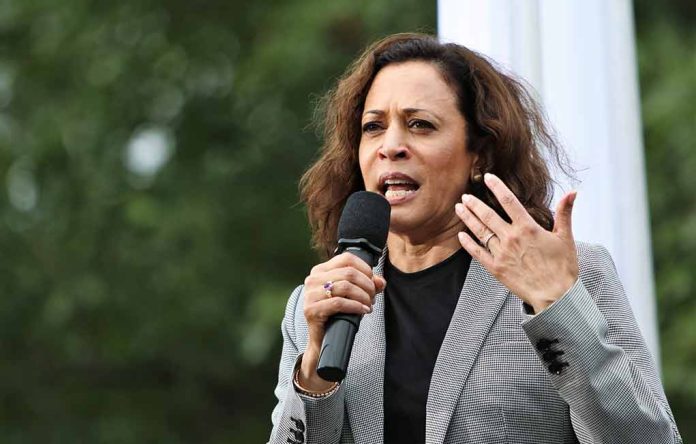
Vice President Kamala Harris’s tenure as San Francisco District Attorney faces renewed scrutiny over police accountability measures, revealing a complex legacy that challenges her tough-on-crime image.
At a Glance
- Harris’s record as San Francisco DA and California AG shows a mix of reform and hard-line policies
- Critics argue her actions on police accountability were insufficient
- Her prosecutorial background, once seen as a liability, may now be an asset in the changing political landscape
- Harris’s complex record defies simple categorization as either tough-on-crime or overly lenient
- The debate highlights the challenges in implementing meaningful justice reform
A Mixed Record on Law Enforcement
Kamala Harris’s career in law enforcement, spanning from San Francisco District Attorney to California Attorney General, has been marked by both liberal reforms and tough-on-crime policies. This duality has led to accusations of political opportunism, with critics labeling her a “political chameleon” rather than a consistent prosecutor.
During her tenure as San Francisco DA, Harris implemented the Back on Track program for nonviolent offenders and saw increased felony and gun crime convictions. However, her controversial truancy policy, which prosecuted parents of habitually absent children, was criticized for disproportionately affecting Black families.
Challenges in Police Accountability
Harris’s relationship with police and reform activists has been strained. Critics point to her reluctance to prosecute police officers for excessive force and her infrequent use of state law to investigate local law enforcement abuses. This has led to questions about her commitment to police accountability and reform.
Despite these criticisms, Harris did initiate some reforms, including anti-bias training for officers and the implementation of body cameras, influenced by the Black Lives Matter movement. However, these measures were seen by some as insufficient to address systemic problems within law enforcement.
Shifting Political Landscape
The political climate surrounding crime and policing has evolved significantly since Harris’s time as a prosecutor. With rising crime rates and concerns over homelessness and drug addiction, voter anxiety has increased, leading to a shift away from the “progressive prosecutor” movement.
This change in public sentiment has repositioned Harris’s prosecutorial background. Once seen as a liability during her first presidential run, it is now viewed more favorably. As she potentially positions herself for the 2024 presidential race, her law enforcement experience could become an asset, especially when contrasted with Donald Trump’s legal challenges.
The Complexity of Justice Reform
Harris’s record highlights the inherent difficulties in implementing substantial change within the criminal justice system. Her efforts to balance reform with traditional law enforcement approaches underscore the complexities faced by those in positions of power.
Every American should be treated with dignity and respect by law enforcement. Yet, that has not always been true for communities of color, where cases of discriminatory policing and excessive force are too often not met with accountability or justice.
— Vice President Kamala Harris (@VP) September 23, 2021
As Vice President, Harris continues to navigate these complex issues. The Biden administration has adopted a pragmatic approach to crime while attempting limited criminal justice reforms, reflecting the ongoing challenge of addressing systemic problems while responding to public concerns about safety.
Looking Ahead
As the 2024 election approaches, Harris’s prosecutorial experience may prove to be a double-edged sword. While it provides her with a unique perspective on law enforcement and criminal justice issues, it also opens her to criticism from both progressive reformers and tough-on-crime advocates.
The debate surrounding Harris’s record serves as a reminder of the ongoing challenges in achieving meaningful police accountability and justice reform. It also highlights the need for nuanced discussions about the role of law enforcement in society and the complexities of implementing change within established systems.








